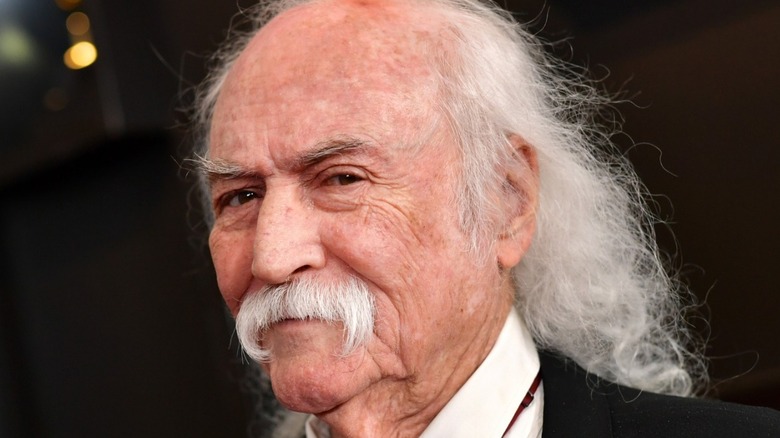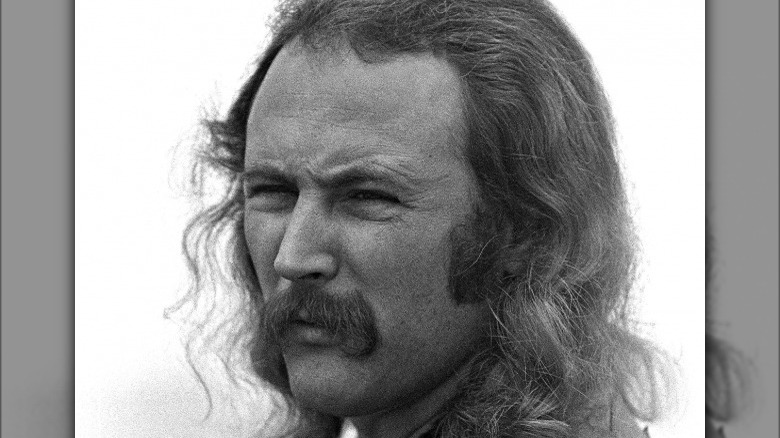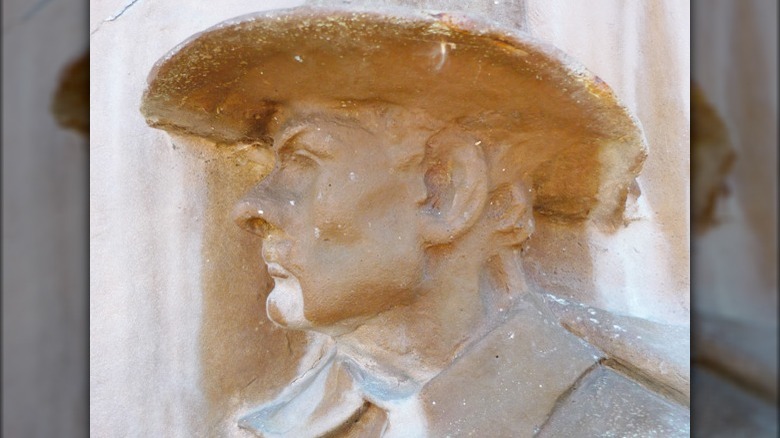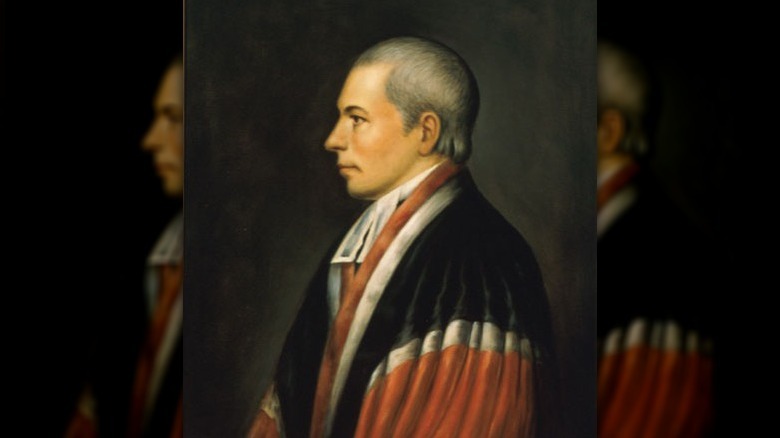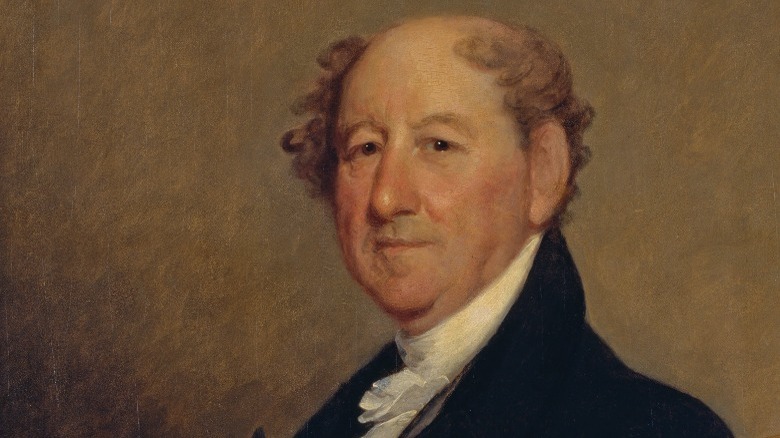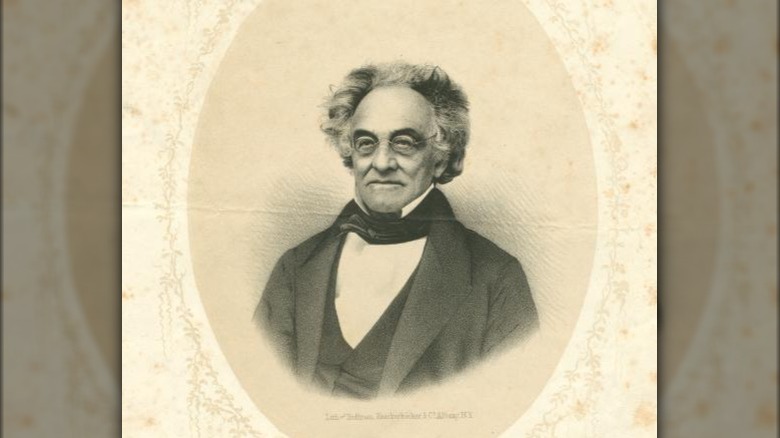David Crosby's Ancestors Helped Build The United States
The music produced today seems to draw inspiration from the classic tunes of decades prior. Though we have a newer generation of artists that dominate the charts, there are still some musicians whose work is nothing short of classic. The decades between the 1950s and 1990s brought us artists like Elvis Presley, Janis Joplin, Michael Jackson, and Whitney Houston. Additionally, bands like The Beatles, The Rolling Stones, and Earth, Wind & Fire became the music icons we know today. Another band that started during the heyday of classic rock at the time was Crosby, Stills & Nash, also known as Crosby, Stills, Nash & Young.
This British–American folk group was formed in 1968 after all its members left their former bands. The group released its self-titled debut album in 1969, which was on the music charts for years, and followed it up with two more number one albums in 1970 and 1971 (per Britannica). The group would go on to have even more success over the years due in part to one of its founders, David Crosby, who has a fascinating history of his own.
David Crosby's interesting history
David Crosby was born David Van Cortlandt Crosby on August 14, 1941 in Los Angeles, California (per Los Angeles Times). His father was a cinematographer, and his mother was a singer and poet who raised both of her sons around music. Though he became an extremely popular music artist over the last six decades, David Crosby's ancestry would not necessarily indicate that he would become a rock & roll legend.
Despite being born in California, Crosby's family was originally from New York (per the Los Angeles Times). His family name was tied to the very wealthy and influential New York and New England families. Both of these bloodlines can trace their ancestry back to the early days of the United States. As it turns out, some of Crosby's ancestors are who we have to thank for a lot of important work in establishing the modern-day United States.
John Underhill: A disgraced captain
David Crosby's famous ancestry stretches back to before the United States even became a country. One such ancestor is Captain John Underhill. His exact birth year is something debated by historians and genealogists. According to the Underhill Society of America, Capt. Underhill was born in 1597, though records from the American colonies have his birthdate listed as at least ten years later. Underhill was born in the Netherlands to English parents and served as a cadet for the Prince of Orange.
According to the Historical Society of New York Courts, he obtained the title of Captain for the Massachusetts Bay Colony and a selectman for Boston. Despite the respect he received for his service to the colony, things went awry. Underhill began following the religious teachings of John Wheelwright; teachings that were not accepted by the Puritanistic Massachusetts Bay Colony (per the New England Historical Society). Underhill was made a scapegoat; accused of adultery and banished from the colony. The banishment was eventually overturned.
Captain Underhill died on July 21, 1672, in his last home in Oyster Bay, N.Y. (via the Historical Society of New York Courts).
William Paterson: A small states advocate
David Crosby's ancestor William Paterson was a figure who was pivotal in the establishment of the United States that we know today. Paterson was a native of Ireland who emigrated to the United States. He was an alumnus of Princeton University with a focus on topics that involved citizenship and legal rights (per the U.S. Army Center of Military History). A staunch patriot, Paterson would go on to manage New Jersey's military forces during the Revolutionary War.
Following the war, Paterson represented New Jersey in the Constitutional Convention. He attended the 1787 convention with the idea in mind of improving the Articles of Confederation instead of scrapping it altogether. Paterson also took issue with the Virginia Plan, which not only laid out the three branches of government, but advocated for a strong federal government with representation in Congress based on a state's population. Paterson saw this as damaging to the voices of small states and countered it with his New Jersey Plan, which called for equal representation in Congress, regardless of a state's size and population (per Dickinson College).
The U.S. Army Center of Military History states that Paterson was one of the first senators representing New Jersey in the new government. He later served as governor of New Jersey and became an associate justice of the U.S. Supreme Court until he died in 1806.
Rufus King: A Founding Father
Crosby's ancestors also include another framer of the Constitution, Rufus King. He was born in Scarboro, Massachusetts (a portion of the former colony that is modern-day Maine). Coming from a line of citizen soldiers and loyalists of England's rule, King found himself allying with the Patriotism cause. He received his higher education from Harvard University. The U.S. Army Center of Military History states that King did not serve in the military, deferring service in favor of his education until 1778.
King rose to prominence as a lawyer, which led to him being chosen as a representative of Massachusetts to the Constitutional Convention. Moving to New York City, King made his way up the political ladder and eventually served as one of the first senators from New York. The U.S. Senate's website notes that King was instrumental in creating the First Bank of the United States. A staunch Federalist, King was the party's last presidential candidate (per The Gilder Lehrman Institute of American History).
One of King's lesser-talked-about stances was regarding slavery. The Gilder Lehrman Institute explains that King passionately opposed the spread of slavery in the United States, leading a group of senators against the proposed Missouri Compromise. His arguments included the legal interpretation of how Congress could restrict slavery instead of bowing to the interests of southern slaveowners. However, the Missouri Compromise was passed anyway. King died in 1827.
John A. King: A governor and advocate
While Crosby's family tree is filled with notable figures, John A. King definitely stands out in his own right. The son of Senator Rufus King, the younger King received his education overseas, notably in England and Paris. He later pursued a legal career in his native New York (per the National Governor's Association). He served during the War of 1812 and began his political career in 1819. During his career, King served in various positions for New York's state government and even served two years in the U.S. House of Representatives. In 1857, he was elected governor of New York, serving as the state's first Republican governor. According to the website for the state of New York, King was an advocate for granting voting rights to Black Americans and improving schools.
David Crosby's legacy as both an iconic and influential musician is part of his family tree's pantheon of important people, including those who influenced the early years of the United States. With ancestors like Captain John Underhill, Framers of the Constitution William Paterson and William King, and Gov. John A. King, it was almost as if David Crosby was destined for some kind of greatness.
